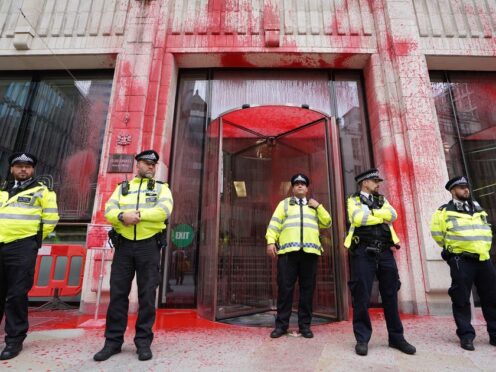
Protesters accused of criminal damage cannot use a legal argument described as the “last line of defence” against prosecution by campaigners, the Court of Appeal has ruled.
Three judges ruled protesters cannot claim at trial that they honestly believed a property owner would have consented to damage caused if they were fully aware of its “circumstances”, such as the impact of climate change.
The judges said political beliefs are “too remote” to be classed as a “lawful excuse”.
Last month the Court of Appeal considered whether the defence could be used after several protesters were found not guilty of criminal damage.
On Monday, Lady Chief Justice Baroness Carr, Lord Justice William Davis and Mr Justice Garnham ruled that “circumstances” could include the “time, place and extent” of the damage and the fact that it occurred during a protest, but not the reasons behind it.
Giving a summary of the judgment, Baroness Carr said: “The circumstances would not include the political or philosophical beliefs of the person causing the damage.
“They would not include the reasoning or wider motivations for the damage. These matters are too remote from the damage. Evidence from the defendant about the facts of or effects of climate change would be inadmissible.”
Attorney General Victoria Prentis had referred the matter to the court after a protester, known only as XX for legal reasons, had been cleared of conspiracy to damage property following a trial.
Government barristers previously told a hearing in London that protesters did not have a “carte blanche” to damage property and that the law was being applied “too broadly and in reality wrongly”.
But lawyers for XX claimed it was a “matter for the jury” whether the defence could be used and that taking the decision away from jurors was a “line that cannot be crossed”.

On the day of the hearing, several protesters staged a sit-in protest at the Royal Courts of Justice until after the building had closed to the public.
Tim Crosland, a former barrister and director of climate charity Plan B, who attended the demonstration, said the argument was the “last line of defence” for protesters and that taking it away would prevent juries from deciding “whether an action is justified”.
Monday’s ruling does not affect the outcome of previous trials but will affect what defences are available to protesters in future cases.
In the court’s written judgment, Baroness Carr said: “It was not Parliament’s intention … to give protesters free rein to publicise their cause through the criminal courts.”
She added that the law “was not intended to afford a defence to protesters based on the merits, urgency or importance of their cause, nor the perceived need to draw attention to a cause or a situation”.
The most senior judge in England and Wales continued: “‘Circumstances’ in the phrase ‘the destruction or damage and its circumstances’ do not include the merits, urgency or importance of the matter about which the defendant is protesting, nor the perceived need to draw attention to a cause or situation.”
Following the ruling, Ms Prentis said: “Climate change is an important issue and, while the right to protest must be protected, it does not give a right to cause serious criminal damage, no matter how strongly held a belief is.
“Today’s judgment is important as it ends any uncertainty over when a person has a lawful excuse to cause damage because they honestly believed the property owner would consent.
“It clarifies that the importance or merits of a protest are not the “circumstances” of damage caused during that protest.
“It is essential that these cases are dealt with consistently, so we welcome the court’s ruling, which will ensure consistency and give judges much-needed clarity in this important area of law.”

Enjoy the convenience of having The Sunday Post delivered as a digital ePaper straight to your smartphone, tablet or computer.
Subscribe for only £5.49 a month and enjoy all the benefits of the printed paper as a digital replica.
Subscribe